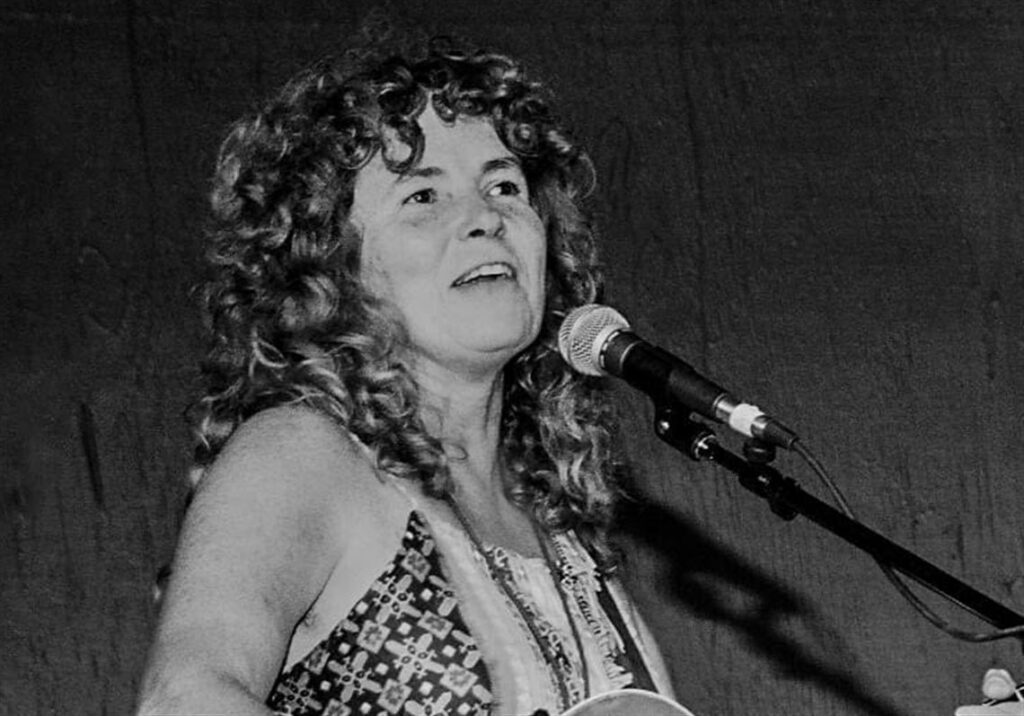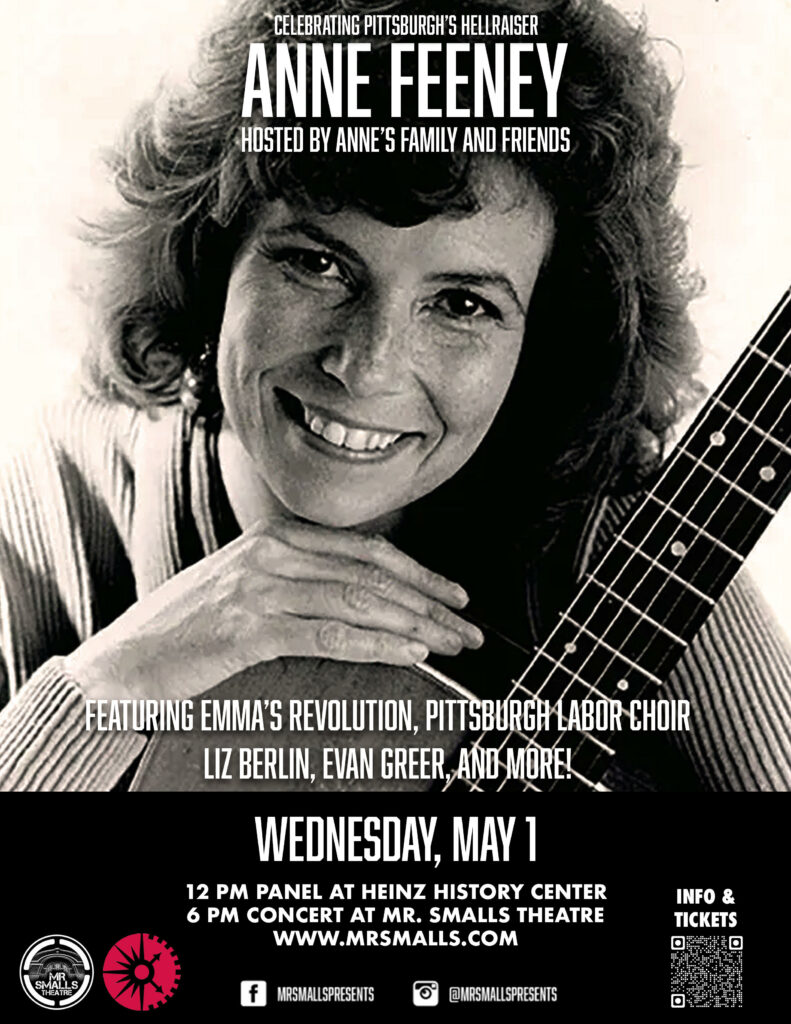In 2021 COVID-19 robbed Anne Feeney of her life at age 69. Then the pandemic doubled down and denied her family, friends and fans the opportunity to join together and share their love and memories of the activist, folk singer, songwriter and musician in a big public way.
That will be rectified on Wednesday, May 1, in two parts: a free panel discussion titled “Anne Feeney’s legacy: what Pittsburgh’s hell-raiser can teach us about art and resistance” at noon at the Heinz History Center in the Strip District, and a memorial concert at 6:45 p.m. (doors open at 6 p.m.) at Mr. Smalls in Millvale. The concert is free with an RSVP, with a suggested donation of $25 or more to help cover costs. The panel discussion includes admittance to the new History Center exhibit “A Woman’s Place: How Women Shaped Pittsburgh.”
The events were planned by Feeney’s daughter, Amy Sue Berlin, and the hell-raiser’s longtime friend and touring partner, queer punk singer Evan Greer.
“Going through my mom dying during COVID, we basically knew at some point we would want to do something together and in person because my mom was a larger-than-life personality who loved a good party. We knew it would be important for her and to provide a place for the many people from walks of her life to be together,” Berlin said.
She added that a public memorial was in the works to take place last year, but they held off when the History Center said it was including Feeney in the exhibition “A Woman’s Place: How Women Shaped Pittsburgh,” which opened last month.
“I knew that was a perfect time to put together this memorial,” Berlin said. “I thought it would be nice to have these two things line up together.”
Under strict COVID-19 restrictions, Berlin and her brother, Daniel Berlin, were able to be at the hospital with their mother when she died. Berlin said it was heartbreaking to know that there were others who couldn’t have loved ones with them at that time and were dying alone.
“That is a huge part of why [having an in-person event] is so important. It was three months before I could hug anyone. I hadn’t really thought about why we have funerals. … There’s so much healing that can take place when you can be together and share these moments. Not being together is detrimental to the grieving process.”
Feeney was born on July 1, 1951, in Charleroi and grew up in Brookline. Her grandfather William Patrick Feeney was a first-generation Irish immigrant, a mine workers’ organizer, and violinist who used music to support his organizing.
Anne was a trial lawyer until she quit that job in the late 1980s to devote herself full time to music, touring and performing in support of social causes, particularly the labor movement. During her 30-year-plus musical career, she performed 4,000 shows in North America and Europe and released 12 albums. She played with such artists as Pete Seeger, Loretta Lynn, John Prine, Toshi Reagon, The Mammals, Dan Bern, the Indigo Girls and Billy Bragg. Her best-known song — “Have You Ever Been to Jail for Justice?” — was covered by Peter, Paul and Mary in 2004.
Women’s issues were high on her list. Her campaign for a local rape crisis center led to the formation of Pittsburgh Action Against Rape, and she worked on the board of the Pennsylvania chapter of the National Organization of Women. She was the first and only woman to serve as president of the Pittsburgh Musicians’ Union.
“She cared a lot about music as a tool for advancing social movements,” said tour mate Greer. “She was a major mentor of mine, and she taught me a lot about music and being a working musician and, more importantly, taught me the meaning of solidarity.
“She really saw herself as part of a collective.”
“My mom really saw the humanity in every person and individual,” Berlin said. “Every holiday we would have like eight people sitting around our table, and I would think, ‘Who are these people?’ She would find the most interesting creative wonderful people. She didn’t judge people by our stereotypical norms. That has been a huge influence on myself and my brother.”

Feeney was most known as a friend of labor, performing at picket lines and in union halls. It’s no coincidence that the events honoring her are taking place on May 1, known as May Day and International Workers Day.
“It’s so funny — people would ask me, ‘Why are you doing this on a Wednesday?’” Berlin said. “Obviously it’s International Workers Day, and my mom pretty much dedicated her entire life to the worker and workers’ rights. She deeply cared about May Day and always had a big day or concert and was always involved in some big event.”
“Anne would have said, and did clearly, that it was the real Labor Day,” Greer said. “She was a fan of the ‘Wobblies’ [members of the International Workers Union] and of the history of the labor movement. It was her Christmas. It seemed right to honor her on the beautiful first of May.”
Including Feeney in the History Center exhibition, which has been extended through January, was a natural choice, according to Anne Madarasz, the director of the museum’s curatorial division and chief historian. The family donated many artifacts to the History Center after her passing, creating an Anne Feeney collection.
“We thought, what a great story to tell. We wanted to give it the due it deserves,” Madarasz said.
In addition to the guitar Feeney played for much of her career, on loan from the family for this exhibition, the materials include photography of her performing and items from her extensive T-shirt collection. One of the first things visitors see when entering the exhibition is a Feeney T-shirt that reads: “A woman’s place is in her union.”
The panel discussion, moderated by Greer, will feature Pittsburgh labor organizer and former vice president of SEIU Rosemary Trump, nationally known women’s rights organizer Jeanne Clark, local activist Kipp Dawson, and activist musicians Bev Grant and Taina Asili.
“There are so many great anecdotes and stories about her life that reflect on this greater history. … She is a piece of history,” Greer said. “Explaining her story can tell us a lot about the last several years of these movements and what the future of them look like.
“It is also about Pittsburgh and recognizing that Pittsburgh has been a main character in Anne Feeney’s life,” Greer added. “She was always a Pittsburgh girl. She cared about Pittsburgh and was involved in its struggles and was beloved in Pittsburgh.”
The Feeney celebration will continue with the concert Wednesday evening at Mr. Smalls and will include Greer, folk duo Emma’s Revolution, the Pittsburgh Labor Choir, Liz Berlin of Rusted Root, local singer/songwriter Mike Stout, and more.
“Anne loved to throw a good party,” Greer said. “Anne would be pissed if it was a sad funeral event. She would want people to enjoy themselves in celebration. I hope that is what this concert will be — to mourn but also to celebrate her legacy and look to the future. She had a strong connection to the past and music but with an eye toward the struggle never ends.”
What would Feeney think of all this?
“She would be thrilled, but she would probably tell me what I was doing wrong,” Berlin said, laughing. “She was a very opinionated woman, and she wanted things to be the most spectacular they could be. And she would probably give me crap about not paying the musicians. … She would be outraged,” she added with a chuckle.
Greer said, “I imagine her asking, ‘What you are doing next about the injustices of the world … that the next generation will have more joy than the last?’ That is the challenge she will be giving us.”

Karen is a copy editor at the Pittsburgh Post-Gazette, but she's currently on strike. Email her at kcarlin@unionprogress.com.



